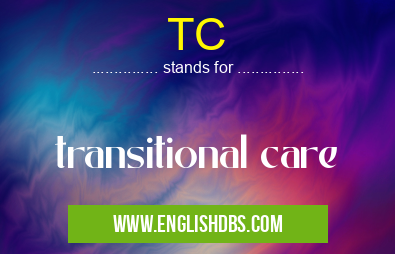What does TC mean in BRITISH MEDICINE
TC is an abbreviation for Transitional Care. Transitional Care, also known as post-acute care, is a form of healthcare provided to individuals after they have been discharged from a hospital or other medical facility. It involves helping the individual with their medical needs while transitioning back into the community or to a higher level of care depending on their condition. The purpose of transitional care is to reduce the risk of complications or regression in health condition due to inadequate follow up and treatment and to ensure that physical, mental, psychological, and social well-being are maintained during the transition period.

TC meaning in British Medicine in Medical
TC mostly used in an acronym British Medicine in Category Medical that means transitional care
Shorthand: TC,
Full Form: transitional care
For more information of "transitional care", see the section below.
Definition
Transitional Care (TC) is a type of post-acute care designed to facilitate and support an individual’s transition from one healthcare setting to another while ensuring continuity and coordination of care throughout the process. It includes services such as discharge planning, advice and coordination with primary care physicians, home health services, case management services, appointment scheduling for follow-up appointments at various providers and facilities, medication reconciliation, patient education and counseling regarding disease management strategies and continuing lifestyle modifications. TC can be provided by nurses or other clinicians in various settings including hospitals, acute rehabilitation centers, skilled nursing facilities (SNF), long term acute care (LTAC) units, hospices or home health agencies.
Purpose
The purpose of transitional care is to ensure that quality clinical outcomes are achieved while the patient transitions across settings. The goal of TC is to minimize complications associated with changing from one treatment setting to another; ensure appropriate follow up with outpatient providers; help patients maintain functional status; provide counseling on self-management at home; address psychosocial issues related to changing treatments; coordinate safety precautions when needed; track medications taken at each interval following discharge; promote adherence to medication regimens; adjust rehabilitation therapy if needed based on changes in clinical condition; manage chronic illness exacerbations; help identify early signs of relapse in those with mental health conditions; connect patients with resources available in their communities such as support groups or transportation services.
Essential Questions and Answers on transitional care in "MEDICAL»BRITMEDICAL"
What is transitional care?
Transitional care is a health care service that helps people with chronic illnesses or disabilities transition between different levels of health care. It includes services such as home health aides, physical therapy, occupational therapy, and social work assistance to help people adjust to their new circumstances. Transitional care can also refer to bridging the gap between hospitalization and returning home.
Who provides transitional care?
Transitional care is typically provided by an interdisciplinary team, which includes nurses, physicians, therapists, social workers, and other healthcare professionals who are knowledgeable about the patient's condition and support system. The team collaborates to develop a comprehensive plan for meeting the patient’s needs during this time of transition.
What types of medical conditions require transitional care?
Transitional care is often needed for patients who have had surgery or been hospitalized due to an acute illness or injury. It is also used for those with chronic conditions like diabetes or heart disease who need extra support transitioning from one level of care to another such as from inpatient hospitalization back into the community or from long-term acute care back home.
What types of services are included in transitional care?
Services that may be included in transitional care include nursing assessments; medication management; physical therapy; occupational therapy; nutrition counseling; discharge planning; assistance with activities of daily living such as bathing and dressing; psychosocial counseling; case management; access to support groups; and educational materials about managing your condition at home.
How does transitional care help patients after they're discharged from the hospital?
Transitional Care provides continuity of medical treatment across settings by providing education on self-care and improving communication between providers. Additionally it aims to reduce readmissions by identifying problems early on through monitoring signs & symptoms while educating patients on how these can be managed independently at home. It also reduces emergency room visits by helping patients understand when they should seek medical attention outside the hospital setting.
What outcomes can I expect from receiving transitional care?
The outcomes associated with receiving quality transitional care depend on each individual's needs and condition but may include improved coordination and communication between healthcare providers, improved quality of life for patients due to less time spent in hospitals/treatment centers, reduced risk of readmission to hospitals/facilities within 30 days post-discharge and improved functioning overall due to better management of chronic conditions.
Final Words:
Transitional Care serves as an important link between hospitalization or other acute medical care settings and the return home or placement in a higher level of care such as a long term acute care unit (LTAC). This type of care helps ensure optimal outcomes for those receiving it by monitoring changes in health status over time during their transitions between different levels of treatment settings. By providing comprehensive assessments both prior to discharge as well as after return home or move into higher levels of post-acute treatment settings TC addresses many gaps that may exist in traditional medical practices that could result in poor outcomes for patients at risk for readmission within 30 days following their discharge.
TC also stands for: |
|
| All stands for TC |
